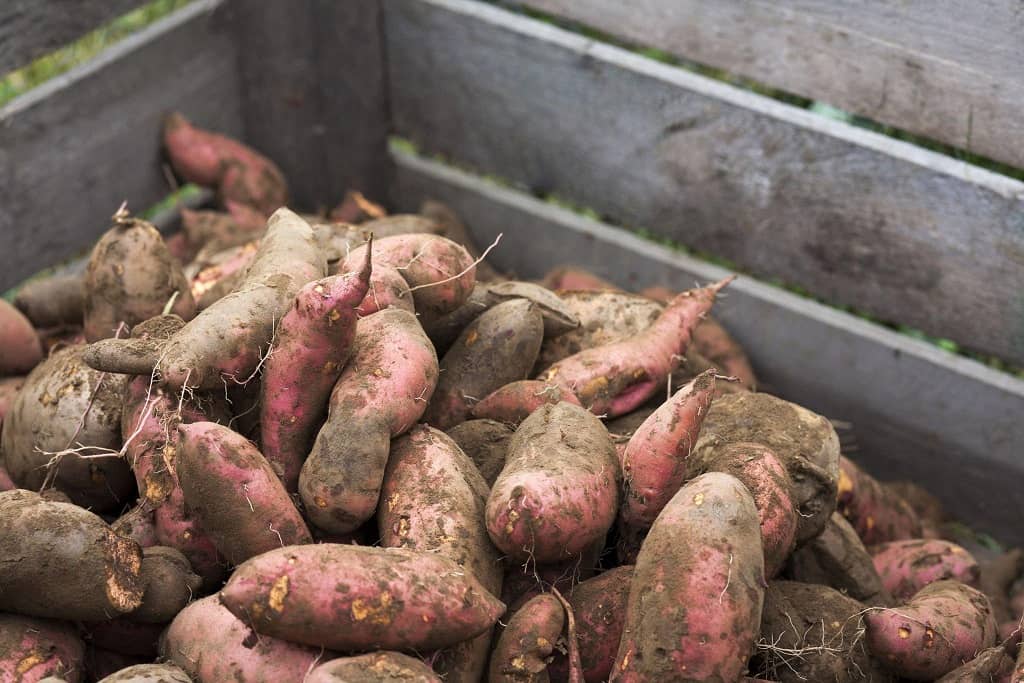When it comes to food, the words “sweet potato” and “dessert” frequently evoke images of mouthwatering flavors and scrumptious treats.
The distinction between sweet potatoes and desserts must be made, though. We will examine the distinctions between sweet potatoes and desserts in this article, including their definitions, nutrient profiles, culinary applications, and more.
What is a Sweet Potato?

Sweet potatoes, scientifically known as Ipomoea batatas, are root vegetables that originated in Central and South America.
They have been cultivated for thousands of years and are now enjoyed worldwide. Sweet potatoes come in different varieties and colors, including orange, white, and purple.
They are rich in essential nutrients and offer a range of health benefits.
Origin and Cultivation

Sweet potatoes have a long history, with evidence of their cultivation dating back to prehistoric times.
They were a staple crop in South America and eventually spread to other parts of the world through trade and exploration.
Today, sweet potatoes are grown in various regions, including Asia, Africa, and the Americas.
Nutritional Profile
Sweet potatoes are highly nutritious and packed with essential vitamins and minerals. They are an excellent source of dietary fiber, vitamins A, C, and B6, potassium, and manganese.
Additionally, they contain antioxidants such as beta-carotene and anthocyanins, which contribute to their vibrant colors and provide health benefits.
What is a Dessert?

Desserts are sweet dishes or confections typically consumed at the end of a meal. They come in various forms, including cakes, cookies, pies, ice cream, and puddings.
Desserts are often indulgent treats enjoyed for their rich flavors and decadent textures.
Definition and Types

Desserts encompass a wide range of sweet treats. They can be classified into categories such as cakes, pastries, chocolates, frozen desserts, and custards.
Each type offers a unique taste and experience, making desserts a beloved part of culinary culture.
Nutritional Aspects
Desserts are typically high in sugar, fats, and calories. While they provide instant gratification to the taste buds, indulging in desserts excessively can lead to weight gain and other health issues.
It is important to consume desserts in moderation and make healthier choices when possible.
Differences between Sweet Potato and Dessert
Although sweet potatoes and desserts both offer sweet flavors, they differ significantly in their purpose, ingredients, preparation methods, taste profiles, and nutritional aspects.
Purpose and Usage

Sweet potatoes are primarily used as a versatile ingredient in savory dishes. They can be baked, boiled, roasted, or mashed and are often enjoyed as a side dish or incorporated into main courses.
Sweet potatoes provide a nutritious and filling component to meals, offering a balance of flavors and textures.
On the other hand, desserts are specifically created to satisfy sweet cravings and provide a delightful end to a meal.
They are meant to be enjoyed as occasional treats or for special occasions. Desserts are often associated with celebrations and are crafted with a variety of ingredients to create indulgent flavors and textures.
Ingredients and Preparation Methods
Sweet potatoes are a natural and wholesome ingredient. They are typically cooked and prepared using minimal additional ingredients, allowing their natural flavors to shine.
Sweet potatoes can be seasoned with spices, herbs, or a touch of sweetness to enhance their taste.
On the other hand, desserts are crafted using a wide array of ingredients such as sugar, flour, butter, eggs, chocolate, fruits, and more.
The combination of these ingredients, along with various techniques such as baking, whipping, or freezing, creates the desired textures and flavors that make desserts irresistible.
Taste and Favor Profiles
Sweet potatoes have a distinct earthy and mildly sweet flavor. The taste can vary slightly depending on the variety and cooking method.
They offer a subtle sweetness that is complemented by their starchy texture. Sweet potatoes can be enjoyed in both savory and sweet dishes, showcasing their versatility.
Desserts, on the other hand, are specifically designed to be sweet and indulgent. They encompass a wide range of flavors, from rich and chocolaty to fruity and creamy.
Desserts often have complex flavor profiles that are carefully crafted to satisfy the craving for sweetness.
Nutritional Differences
Sweet potatoes are a nutrient-dense food. They are low in calories and fat while providing essential vitamins, minerals, and dietary fiber.
The vibrant orange-fleshed sweet potatoes are particularly rich in beta-carotene, which is converted to vitamin A in the body.
They also offer antioxidants and are considered beneficial for gut health due to their fiber content.
Desserts, on the other hand, are generally higher in calories, sugar, and fat.
While they may not provide the same level of nutritional benefits as sweet potatoes, desserts can still be enjoyed in moderation as part of a balanced diet and a healthy lifestyle.
Health Benefits of Sweet Potatoes
Sweet potatoes are not only delicious but also offer numerous health benefits.
Their nutrient profile makes them a valuable addition to any diet. Here are some of the health benefits associated with sweet potatoes:
Vitamins and Minerals
Sweet potatoes are rich in vitamins A, C, and B6, which play crucial roles in supporting overall health. Vitamin A is essential for vision, immune function, and cell growth.
Vitamin C acts as an antioxidant and aids in collagen production, promoting healthy skin and a strong immune system.
Vitamin B6 is important for brain development, metabolism, and the production of neurotransmitters.
Antioxidants and Fiber Content
The vibrant colors of sweet potatoes, especially the orange-fleshed varieties, are an indication of their antioxidant content.
Antioxidants help protect the body from free radicals, which can cause cellular damage.
Additionally, sweet potatoes are a good source of dietary fiber, which aids in digestion, promotes satiety, and supports a healthy gut.
Promoting Gut Health
Sweet potatoes contain a type of dietary fiber called resistant starch. This type of fiber resists digestion in the small intestine and serves as a food source for beneficial bacteria in the large intestine.
By promoting the growth of healthy gut bacteria, sweet potatoes contribute to a balanced and thriving gut microbiome, which is essential for overall health and well-being.
Storage and Shelf Life
Sweet potatoes can be stored in a cool, dark, and well-ventilated space for several weeks.
When stored properly, they can have a long shelf life. Desserts, on the other hand, often require refrigeration or freezing to maintain their freshness and extend their self-life
Conclusion
In summary, sweet potatoes, and desserts may both offer sweet flavors, but they have distinct differences.
Sweet potatoes are versatile root vegetables that provide nutritional benefits, while desserts are indulgent treats enjoyed for their rich flavors.
Sweet potatoes can be incorporated into savory dishes and contribute to a balanced diet, while desserts should be enjoyed in moderation and as occasional treats.
By understanding the differences between sweet potatoes and desserts, individuals can make informed choices to satisfy their cravings while maintaining a healthy lifestyle.
Frequently Asked Questions (FAQs)
Is sweet potato and sweet Yam the same thing?
Sweet potatoes and sweet yams are often confused but they’re not the same. Sweet potatoes belong to the morning glory family while yams are related to lilies.
In the U.S., what’s commonly labeled as “yams” in grocery stores is usually a type of sweet potato. True yams have rough, scaly skin and are starchier than sweet potatoes. The mix-up in names can be traced back to early American marketing.
Are there two types of sweet potatoes?
Sweet potatoes come in various colors and flavors, but two main types dominate the market is Jewel and Garnet.
Jewel sweet potatoes have an orange flesh with a sweet taste while Garnet sweet potatoes boast a reddish-purple skin and similarly sweet orange flesh. Both are rich in nutrients, versatile in cooking, and a tasty addition to your meals.

